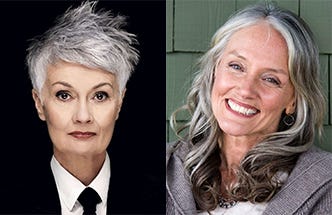The Science of Female Competition
How short hair is an aspect of women's war for male attention
In 2011, I addressed Athol Kay’s response to a woman chopping her hair off in what proved to be a very popular post with what proved to be a rather more controversial title than I had ever imagined.
2011: Don’t Cut Your Damn Hair
Dozens of times in my life I've experienced having one of those mild background crush feelings for a woman, instantly disappear as soon as she cuts her hair very short. I mean seriously, real feelings of attraction just instantly gone. Monday I was into you with your pretty shoulder length hair; Tuesday morning arrived and you walked in with it trimmed away to not all that much, and I have no more attraction to you.
Of course all her friends and coworkers just love her new hair style! Of course they would, she just botched her appearance and if she falls off the top of the sexy ladder, everyone else gets to move up a place. So like OMG I just love it!
I am among the many men who absolutely despise short hair on women. If a woman's hairstyle is described as "cute", I can just about guarantee that I'm going to hate it. Even when an attractive woman can pull it off, she almost invariably looks even better with long hair. Spacebunny has long blonde hair, longer than it was when we met, and I like it just as it is. I would hate for her to cut it off. Athol is correct to point out the ulterior motive women have for praising women who chop their hair off, as it makes them look more attractive in comparison.
So why do women give in to this social pressure to cut their hair off when so many men openly and actively hate short hair? I think there are two reasons, one that applies to younger women and another that applies to older women. Because only a very pretty woman can look attractive in a short hairstyle, female logic tells the woman contemplating hair-butchery that if she cuts her hair off and can manage to pull off the look, then she must be extremely attractive. This sounds absurd to the rational mind, but remember, most women overrate themselves by at least two points because they rate themselves by their hottest-ever hookup rather than by the average of their past romantic record. And since she will inevitably be rewarded with praise from her female friends, she wrongly concludes that she has indeed pulled it off and is therefore highly attractive even as her attractiveness immediately drops a point or two in the eyes of all the men around her.
The second reason is that women are much more concerned about hair health than men are. So, as they age and their hair turns grey, and loses texture and body, they believe they will look better if they just cut it off. Which is ridiculous, at least as far as men are concerned, as evidenced by Athol's preference for his wife's "badly-damaged-with-an-accidental-bleaching-incident" hair to her healthy, natural, brunette hair. One need only to have lived in the 1980s to realize that men could not possibly care less about the appeal of "healthy hair", what with all the perms, home-bleaching, and cheap hair spray that was de rigueur back then.
The unpleasant, but observable fact is that post-menopausal women who cut their hair off tend to look like short, squatty men, especially if they elect to rock that inexplicable blue puff-perm on top that is apparently meant to signify female status or something. Forget which style is more attractive, of the two women below, which looks more female?
Men of any age don't care how healthy a woman's hair happens to look if she looks like a mushroom or a freaking man; it's not as if men turn gay because Matt Damon's coiffure has a healthy and well-conditioned shine.
Anyhow, if you're a woman, let your locks flow long and don't trust any woman who encourages you to chop them off. The more hair, the more better.
2024: The Science of Short Hair
Thirteen years after that post was published on Alpha Game, a pair of scientific studies were published that serendipitously happen to address that very question. And, as it turns out, Athol and I were both correct concerning the ulterior motive that women have in encouraging their female friends, and theoretical rivals for male attention, to reduce their own attractiveness to men.
ABSTRACT
Intrasexual competition between women is often covert, and targets rivals' appearance. Here we investigate appearance advice as a vector for female intrasexual competition. Across two studies (N = 192, N = 258) women indicated how much hair they would recommend hypothetical clients have cut off in their hypothetical salon. Clients varied in their facial attractiveness (depicted pictorially), the condition of their hair, and how much hair they wished to have cut off. Participants also provided self-report measures of their own mate value and intrasexual competitiveness. In both studies, participants' intrasexual competitiveness positively predicted how much hair they recommended clients have cut off, especially when the hair was in good condition and the clients reported wanting as little as possible cut off – circumstances wherein cutting off too much hair is most likely to indicate sabotage. Considering data across both collectively, women tended to recommend cutting the most hair off clients they perceived to be as attractive as themselves. These data suggest that just like mating, intrasexual competition may be assortative with respect to mate value. They also demonstrate that competitive motives can impact female-female interactions even in scenarios which feature no prospective mates, and are nominally unrelated to mate guarding or mating competition.
CONCLUSION
In the current study, female intrasexual competition via rival manipulation was investigated. More competitive participants advised hypothetical salon clients to cut off more hair when that hair was healthy and when clients expressed a wish to have as little hair cut off as possible. Participants advised clients they perceived to be as attractive as themselves to cut off the most hair, and also advised unattractive clients to cut of more than they advised highly attractive clients to cut off. Other than targeting women of similar perceived attractiveness, participants own mate-value had limited impact on haircut advice, suggesting that this type of female intrasexual competition manifests consistently along the mate value spectrum. We observed these effects in a context – advice about a haircut – that was ostensibly unrelated to any identifiable, or implied, mating opportunity or mating threat. These observations lead us to concur with Ayers and Goetz (2022), that future research should broaden the contextual scope within which female intrasexual competition is investigated. We suspect that intrasexually competitive motives may influence the full breadth of female-female interactions, whenever opportunities to manipulate the reproductive outcomes of other women present themselves, irrespective of whether or not those interactions involve an identifiable mating threat for any woman involved.
Trust the science, girls. Trust the science. And men, while we may not understand the vagaries of the female socio-sexual hierarchy, such as it is, much less be able to put accurate labels on it, rest assured that it exists, it is dynamic, and it is hypercompetitive in a wide variety of ways that most of us are not even able to recognize as competition.






A number of years ago two economists studied the prices paid for prostitutes in the Netherlands. They attempted to assign a monetary value on various physical characteristics such as height, weight, cup size, hair length, hair color, etc.
The one thing I remember from the study is that the shortest hair length was monetarily equivalent to the smallest cup size (A or less). To be clear, men greatly preferred the longest hair and the largest breasts.
In short, going for the pixie cut is like choosing to chop off your breasts!
I enjoy the irony of women telling men that they are totally and completely wrong about what men like and find attractive in women.